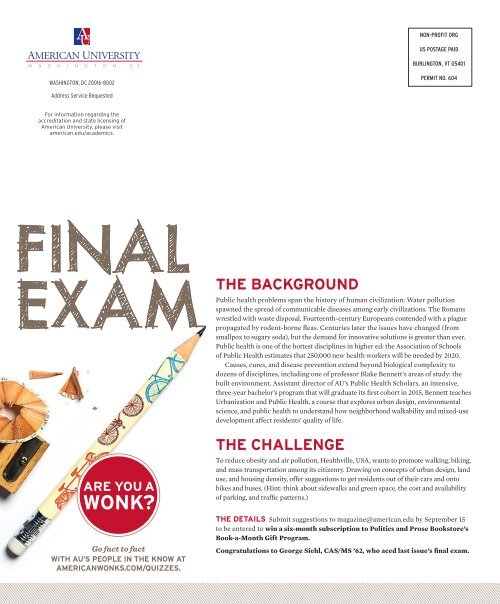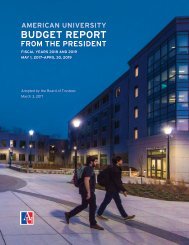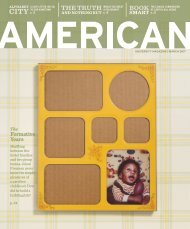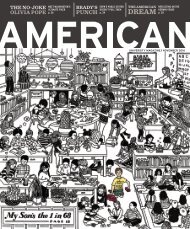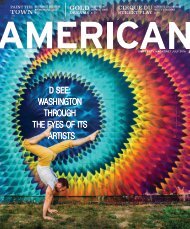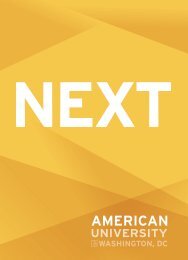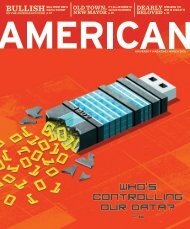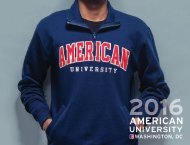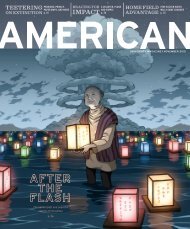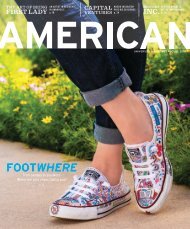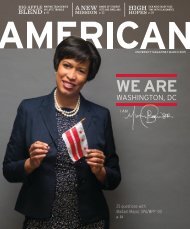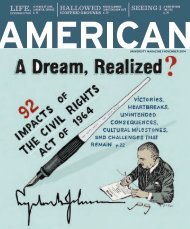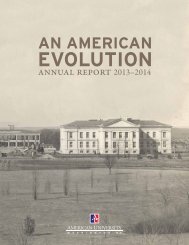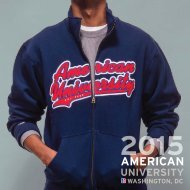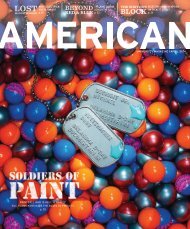American Magazine: August 2014
You also want an ePaper? Increase the reach of your titles
YUMPU automatically turns print PDFs into web optimized ePapers that Google loves.
NON-PROFIT ORG<br />
US POSTAGE PAID<br />
BURLINGTON, VT 05401<br />
WASHINGTON, DC 20016-8002<br />
PERMIT NO. 604<br />
Address Service Requested<br />
For information regarding the<br />
accreditation and state licensing of<br />
<strong>American</strong> University, please visit<br />
american.edu/academics.<br />
THE BACKGROUND<br />
Public health problems span the history of human civilization: Water pollution<br />
spawned the spread of communicable diseases among early civilizations. The Romans<br />
wrestled with waste disposal. Fourteenth-century Europeans contended with a plague<br />
propagated by rodent-borne fleas. Centuries later the issues have changed (from<br />
smallpox to sugary soda), but the demand for innovative solutions is greater than ever.<br />
Public health is one of the hottest disciplines in higher ed: the Association of Schools<br />
of Public Health estimates that 250,000 new health workers will be needed by 2020.<br />
Causes, cures, and disease prevention extend beyond biological complexity to<br />
dozens of disciplines, including one of professor Blake Bennett’s areas of study: the<br />
built environment. Assistant director of AU’s Public Health Scholars, an intensive,<br />
three-year bachelor’s program that will graduate its first cohort in 2015, Bennett teaches<br />
Urbanization and Public Health, a course that explores urban design, environmental<br />
science, and public health to understand how neighborhood walkability and mixed-use<br />
development affect residents’ quality of life.<br />
THE CHALLENGE<br />
To reduce obesity and air pollution, Healthville, USA, wants to promote walking, biking,<br />
and mass transportation among its citizenry. Drawing on concepts of urban design, land<br />
use, and housing density, offer suggestions to get residents out of their cars and onto<br />
bikes and buses. (Hint: think about sidewalks and green space, the cost and availability<br />
of parking, and traffic patterns.)<br />
Go fact to fact<br />
WITH AU’S PEOPLE IN THE KNOW AT<br />
AMERICANWONKS.COM/QUIZZES.<br />
THE DETAILS Submit suggestions to magazine@american.edu by September 15<br />
to be entered to win a six-month subscription to Politics and Prose Bookstore’s<br />
Book-a-Month Gift Program.<br />
Congratulations to George Siehl, CAS/MS ’62, who aced last issue’s final exam.


